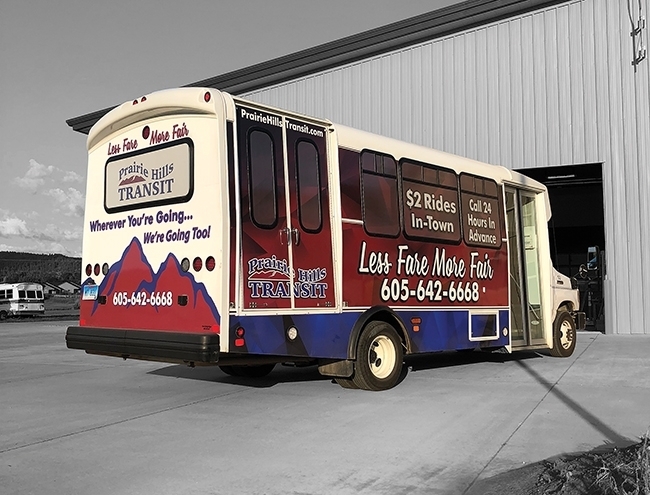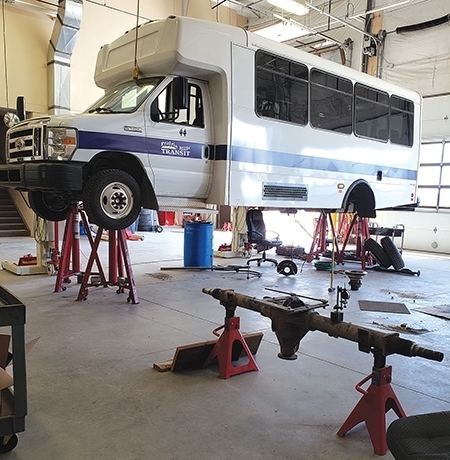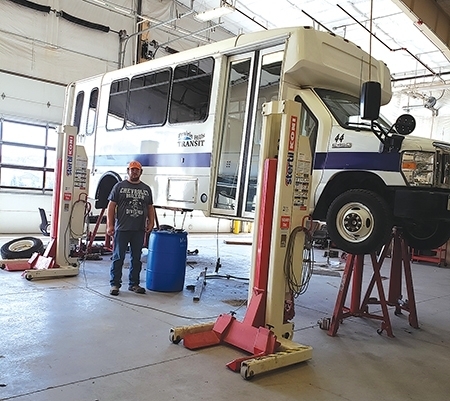
Barb Cline founded the service now known as Prairie Hill Transit in 1989 while working as the director of a nutrition program for senior citizens in Spearfish, South Dakota. While delivering meals, she would often hear from seniors who said they would travel to a central dining location if they only had transportation.
 Operating with a grant from the state’s social services department, Cline launched Spearfish Senior Transportation with a single 1979 van operating four hours per day. This small service grew into a coordinated public transit system today operating across 16,500 square miles.
Operating with a grant from the state’s social services department, Cline launched Spearfish Senior Transportation with a single 1979 van operating four hours per day. This small service grew into a coordinated public transit system today operating across 16,500 square miles.
With eight bus facilities, 45 vehicles, and nearly 60 employees, Prairie Hills Transit is now the main public transportation provider for nine rural counties in South Dakota. Because of the scope of its service, ride quality is always of paramount concern for Cline and the Prairie Hills Transit team.
“We cover a large area of smaller, rural communities, and they are often unable to maintain roads and parking lots at the same levels as urban municipalities,” Cline said. “Years ago, we found that many of our passengers were experiencing rough rides. We provide many medical trips to people with fragile medical conditions, so this was genuinely concerning.”
In February 2018, Cline attended the Bus Summit at Stone Mountain in Atlanta. There she met Dean Bartolone President of LiquidSpring & Travis Ward national bus sales representative for LiquidSpring. LiquidSpring’s proprietary “smart” suspension system is specially tailored for shuttle buses, ambulances, recreational vehicles, and military transportation. After visiting with Mr. Bartolone & Mr. Ward, Cline and her team decided to participate in a system demonstration.
“We were fascinated that Prairie Hills Transit basically redefined transit in rural South Dakota,” Ward said. “Upon meeting Barb, we found her to be extremely knowledgeable and proactive about finding a solution for her drivers and passengers.”
“We told her how our system could help Prairie Hills Transit,” he added. “Whenever someone hears something that seems too good to be true, they’re obviously very skeptical – and that was the case here. So, a demonstration was a perfect opportunity.”
 The LiquidSpring suspension
The LiquidSpring suspension
Ward said that the proprietary LiquidSpring Suspension System is a uniquely “smart” system, which means that an on-board processor automatically adjusts the suspension’s ride based on the terrain and roads over which it travels. Over rough roads, the ride is soft and smooth; and the system automatically stiffens for cornering around sharp turns or emergency maneuvers.
Using an interactive user interface, drivers can manually switch ride modes, adjust the suspension’s height, and mitigate troubleshooting issues.
Ward said that the resulting vibration results in less maintenance and more reliability, reducing passenger fatigue and contributing to better driver health.
Demo’ing the system
LiquidSpring agreed to send Ward out and ship a suspension kit to complete the demo installation in Prairie Hills Transit’s primary maintenance facility in Spearfish. Taking the initiative, Cline invited mechanics from each agency in South Dakota to observe the installation.
“I wanted the state’s agencies to be able to see the installation and decide if it was right for them, as well,” Cline said. “It is always nice when Prairie Hills can offer training of this caliber.”
Three other agencies attended the installation, along with Doug Gorham Procurement Manager of the South Dakota Department of Transportation. Ward said LiquidSpring is always looking for outspoken users who can attest to the efficacy of its system, and Cline was a vocal advocate.
Ward added that the presence of Gorham, the state’s procurement manager, was invaluable; allowing South Dakota’s transportation officials to understand the system’s intricacies and that the suspension is not “too good to be true.”
“Before the state or any of its agencies could order the suspension system, it had to be on procurement,” Gorham said. “That was a big first step. When I was on-site for the demo installation, I was able to speak with Travis at length about the product and its features. I did some research on my own, and then we were able to add the LiquidSpring product as an option on our next bus procurement – so, if they want to, any of South Dakota’s transit agencies can purchase the system.”
“Doug was able to ride on a bus equipped with LiquidSpring, and he could clearly feel the difference between our product and a standard bus,” Ward added.
 The system in action
The system in action
Once the first installation was complete, Cline assigned the LiquidSpring-equipped bus to a driver known to be highly selective of new vehicles. She told him to be completely honest about how the system’s handling, ride quality, and what his regular riders said.
“He had tried quite a few other suspension systems over the years,” she said. “He gave the LiquidSpring system his seal of approval. He said it was a much better ride, and that that the passengers really liked it”
In the meantime, LiquidSpring was able to provide further demo rides to Cline and other South Dakota transit agency sirectors attending the CTAA EXPO in Pittsburg, PA. which resulted in an initial order of three systems for retrofit. Operations and Information Director Lisa Johnson was extremely impressed with the smoothness of the ride.
Cline said Prairie Hills Transit opted for aftermarket installations on three vehicles the agency had recently purchased, intending to purchase vehicles with pre-installed suspensions in the future.
“The installation by Taylor the mechanic at Prairie Hills Transit, was impressive,” Ward said. “LiquidSpring installations are fairly complicated – thus the need for a demonstration – but Taylor was able to complete all three retrofits after seeing just one retrofit installation. And those vehicles are still operating!”
 Driving over terrain such as bridge abutments, bumps in parking lot entrances, or even potholes can cause jarring and discomfort for passengers who experience pain due to medical conditions. Gorham and Cline both said that the system has made a significant difference for those passengers.
Driving over terrain such as bridge abutments, bumps in parking lot entrances, or even potholes can cause jarring and discomfort for passengers who experience pain due to medical conditions. Gorham and Cline both said that the system has made a significant difference for those passengers.
Cline described a testimonial in July from a driver using a bus equipped with the LiquidSpring suspension. The driver was coming back to headquarters after completing a trip, and ran into significant rain, hail, and strong wind. He said he flipped the switch to modify the system’s ride mode to Sport Mode, and the bus held steady and did not rock at all due to the strong winds.
 It was this driver’s first experience with the LiquidSpring system in inclement weather and he was effusive in his praise. Cline said that, because this driver was older and very experienced with driving in sub-optimal weather conditions, she believes the difference was truly due to the suspension.
It was this driver’s first experience with the LiquidSpring system in inclement weather and he was effusive in his praise. Cline said that, because this driver was older and very experienced with driving in sub-optimal weather conditions, she believes the difference was truly due to the suspension.
“Passengers have also noticed the difference in ride quality when using the system,” Gorham added. “Many have asked about what is different in the newer buses, and some have asked how to ensure that they always ride on a bus with the LiquidSpring system.”
As Cline intended, Prairie Hills Transit’s four most recent bus purchases (made in February 2020) included pre-installed suspensions by LiquidSpring. The agency now operates seven vehicles equipped with the “smart” suspension.
“As we replace vehicles in different communities, we will continue to bring in new vehicles with LiquidSpring’s suspension installed,” she said. “I continue to refer other South Dakota and North Dakota agencies to the system; spreading the word about the positive things which drivers, passengers, and mechanics are saying.”
“When you find a product that is affordable and honestly makes a difference,” she added, “then you want other agencies and people to benefit, too.”
